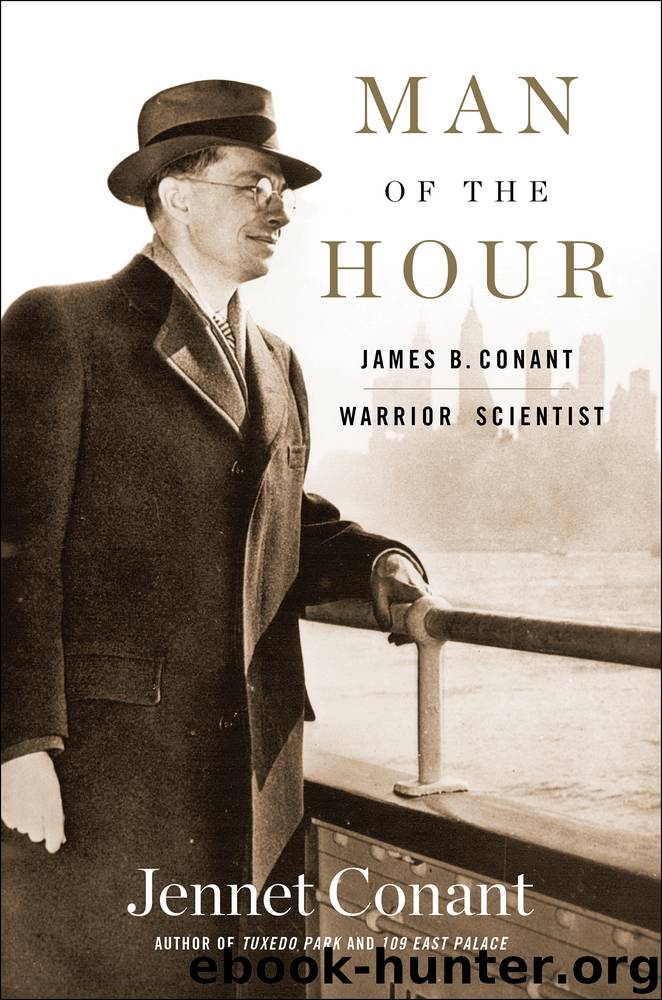Man of the Hour by Jennet Conant

Author:Jennet Conant
Language: eng
Format: epub
Publisher: Simon & Schuster
CHAPTER 16
* * *
One Fell Stroke
The essence of war is not slaughter but impressing your will upon the enemy.
—JBC to Vannevar Bush
As the Anglo-American high command perfected its plans for the invasion of Europe, Conant continued to face the very real possibility that the Germans would produce an atomic bomb before the Allies could. For all his expressions of optimism, he had far too much respect for Werner Heisenberg and the physicists at the Kaiser-Wilhelm Institute to count them out for a moment. Until he had proof to the contrary, he had to assume the Nazis were working on their nuclear program with the same feverish intensity as the Manhattan Project scientists.
What kept him awake at night was how little was known about Germany’s progress toward a nuclear weapon. If nothing else, it made it impossible to estimate realistically how much time they had left to complete their own project. Their ignorance was a thorn in Conant’s side that kept him unsettled and constantly on edge. He took some comfort in the idea that the enemy must be encountering the same baffling problems, observing in a private memorandum that “at least every difficulty that develops means probably an equal difficulty for the Germans!” His main concern was that the Nazis would stumble on to simple solutions to puzzles that Los Alamos was still struggling with; solutions that would propel them over the finish line first.
For months, the Reich had harped on its plan to use a secret scientific weapon in retaliation for Allied air attacks. On December 3, 1943, a Berlin radio broadcast declared that Germany would end the war “by one fell, drastic stroke,” adding, “Mankind is not far from the point where it can blow up half the globe.” Some of the refugee scientists at the Met Lab and Los Alamos were convinced the Germans were preparing to use atomic bombs against the United States or, more likely, England. One even urged Groves to make an official broadcast warning the American people of the danger of a nuclear attack—a possibility the general considered sufficiently remote that he rejected doing any such thing. “Although this was sometimes hard on our nerves,” Groves acknowledged later, “it did keep us from ever becoming overconfident.”
When the Manhattan Project assumed responsibility for all atomic intelligence in the fall of 1943, Conant and Groves agreed that their first priority must be to remain as informed as possible on the danger posed by German science. It was absolutely essential that they know what the other side might be capable of if their backs were to the wall. The steady stream of rumors from behind enemy lines stoked everyone’s fears and suspicions but provided few details about the status of the German atomic program. (The Japanese did not concern them, not because they doubted their technical competence but because it would be too great an undertaking for their industry.) Early in the war, evidence of Germany’s interest in making a bomb had surfaced when the Nazis
Download
This site does not store any files on its server. We only index and link to content provided by other sites. Please contact the content providers to delete copyright contents if any and email us, we'll remove relevant links or contents immediately.
| Africa | Americas |
| Arctic & Antarctica | Asia |
| Australia & Oceania | Europe |
| Middle East | Russia |
| United States | World |
| Ancient Civilizations | Military |
| Historical Study & Educational Resources |
Cat's cradle by Kurt Vonnegut(15324)
Pimp by Iceberg Slim(14476)
4 3 2 1: A Novel by Paul Auster(12363)
Underground: A Human History of the Worlds Beneath Our Feet by Will Hunt(12081)
The Radium Girls by Kate Moore(12012)
Wiseguy by Nicholas Pileggi(5765)
The Fire Next Time by James Baldwin(5422)
Perfect Rhythm by Jae(5393)
American History Stories, Volume III (Yesterday's Classics) by Pratt Mara L(5293)
Paper Towns by Green John(5174)
Pale Blue Dot by Carl Sagan(4993)
A Higher Loyalty: Truth, Lies, and Leadership by James Comey(4946)
The Mayflower and the Pilgrims' New World by Nathaniel Philbrick(4484)
The Doomsday Machine by Daniel Ellsberg(4480)
Killers of the Flower Moon: The Osage Murders and the Birth of the FBI by David Grann(4433)
The Sympathizer by Viet Thanh Nguyen(4382)
Too Much and Not the Mood by Durga Chew-Bose(4333)
The Borden Murders by Sarah Miller(4302)
Sticky Fingers by Joe Hagan(4185)
